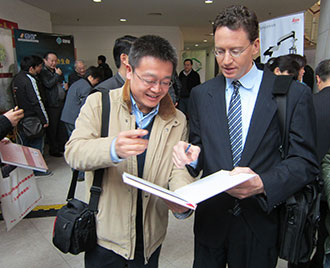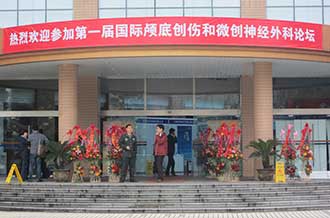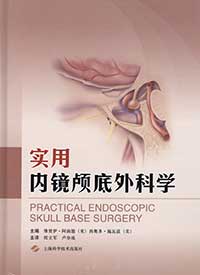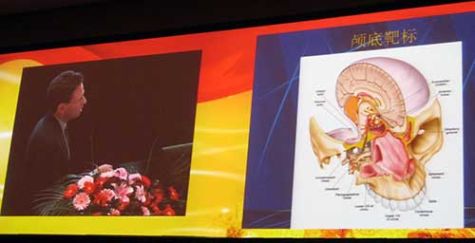
Theodore H. Schwartz, MD, director of the Pituitary and Anterior Skull Base Surgery Program at the Weill Cornell Brain and Spine Center, recently spent four days in Shanghai, helping Chinese neurosurgeons develop their skills in minimally invasive endoscopic surgery.
Dr. Schwartz was the honored guest at the “First International Forum on Skull Base Trauma and Minimally Invasive Neurosurgery and First Workshop on Endoscopic Skull Base Surgery” at the Neurosurgical Department of Changzheng Hospital and the Neurosurgical Institute of Shanghai. Changzheng Hospital is one of the largest hospitals in China, and is a leading center for both treatment and research. The chairman of its neurosurgery department had recently attended one of Dr. Schwartz’s Continuing Medical Education courses on endoscopic pituitary surgery at Weill Cornell, and was so excited by the techniques he learned there that he arranged for the course to be brought to China.
 Dr. Schwartz, who has previously traveled to India, Brazil, France, Austria, and Scotland to demonstrate advanced endoscopic surgical techniques, spoke about the range of minimally invasive procedures available to remove brain tumors from the skull base. He travelled to China with Madeleine Schaberg, MD, an otolaryngologist at the New York Eye and Ear Infirmary and a former Fellow of Vijay Anand, MD, Dr. Schwartz’s partner at Cornell.
Dr. Schwartz, who has previously traveled to India, Brazil, France, Austria, and Scotland to demonstrate advanced endoscopic surgical techniques, spoke about the range of minimally invasive procedures available to remove brain tumors from the skull base. He travelled to China with Madeleine Schaberg, MD, an otolaryngologist at the New York Eye and Ear Infirmary and a former Fellow of Vijay Anand, MD, Dr. Schwartz’s partner at Cornell.
More than 100 Chinese neurosurgeons attended the forum, where Dr. Schwartz lectured on minimally invasive skull base techniques as well as demonstrated those techniques in a laboratory cadaveric demonstration. The participating neurosurgeons, eager to advance the practice of endoscopic surgery in China, will bring the techniques they learned back to their hospitals throughout the mainland.
 In advance of the forum, the hosts had arranged to have Dr. Schwartz’s textbook, “Endoscopic Skull Base Surgery,” translated into Chinese – the first minimally invasive skull base surgery book translated. The book, published in the United States in November 2011, is an authoritative volume that covers surgical techniques, patient selection, and endocrine and neuro-ophthalmologic considerations, and also includes an in-depth discussion of the merits of endoscopic versus microscopic tumor resection.
In advance of the forum, the hosts had arranged to have Dr. Schwartz’s textbook, “Endoscopic Skull Base Surgery,” translated into Chinese – the first minimally invasive skull base surgery book translated. The book, published in the United States in November 2011, is an authoritative volume that covers surgical techniques, patient selection, and endocrine and neuro-ophthalmologic considerations, and also includes an in-depth discussion of the merits of endoscopic versus microscopic tumor resection.
"It was an extremely rewarding trip," says Dr. Schwartz. "The Chinese neurosurgeons were extremely hospitable and enthusiastic, and they demonstrated such an obvious eagerness to bring our latest endoscopic techniques to their skull base programs in China. It’s very gratifying to me personally and professionally to be able to advance this field on the other side of the globe."
